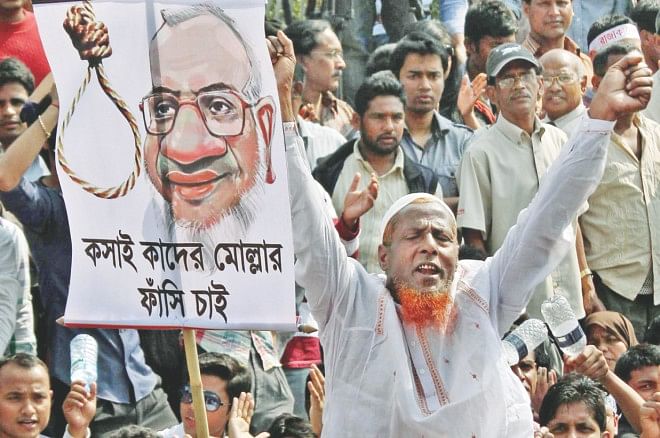The day, the killers, the tribunal

As the war for independence neared its end, a final attempt to eliminate the members of then known as East Pakistan’s intelligentsia was executed by the Pakistani military junta. Mostly planned between 12 and 14 December over a 1000 academics, journalists, physicians and lawyers, including people from other professions were ruthlessly murdered. However, the campaign intended to strip the newborn nation of its intellectuals did not succeed and a new nation did emerge.
The killings of, 14th December 1971, were a sheer act of desperation by an army that sprang out from fear, hatred and frustration. The Pak intention evidently was to create a crippling-effect – to what would be lost – but with the mindset of a fanatic too. The focus of this year’s intellectuals killing day – unlike before – is not to lament over the systematic and organized killing spree spearheaded by General Rao Forman Ali. It’s not even the motive behind the killings, but now it arrives in the light of the verdicts handed over to some of the members of native auxiliary forces at the time, that helped the Pakistani army for materializing the cold-blooded act.
More specifically: apart from Abdul Quader Mollah , Chowdhury Mueen-Uddin, a Muslim leader based in London, and Ashrafuz-Zaman Khan, based in the US, were also sentenced in absentia after the court found that they were involved in the abduction and murders of some 18 intellectuals during the killing spree. All three have directly and indirectly functioned as Al-Badr activists related to the killing of intellectuals. The chance for the two sentenced in absentia to return home is nil, and also our experience with convicts sentenced in absentia has not been very satisfying with the Sheikh Mujib killing case either. But Quader Mollah’s verdict has kept many of us on tenterhooks.
Inadvertently, it had to be the same December when a hearing on a review petition would halt Quader Mollah from being hanged. The man who was supposed to be in his grave by now is not only alive, but managed to proceed with his review petition with the judges at the upper echelon of our judicial system.
So why was not the chance for a review petition considered earlier by the prosecutors? What was the need for a dramatic announcement of Mollah’s hanging in the first place? Isn’t it annoying to witness, that after having repeatedly been told by the Attorney General that ‘there was no scope for reviewing the death penalty for war criminals’ then why was a hearing held? The law must follow its own course but there is enough reason to believe that if Mollah’s death penalty were lifted then it would clearly come out as a reprehensible case in light of the law being retroactively passed after the Shahbag uprising in order to enable the death penalty to be applied. This will certainly impact and question the impartiality and validity factors of other verdicts too. The already doubtful state of the ICT will even worsen.
This writer is unwilling to observe this year’s martyred intellectuals’ day as a formal event, as held many times before; instead he thinks differently. He thinks that reforms are needed to give our ICT a global acceptance. We want the ICT to meet the highest standards in order to properly deliver on those promises for the victims that could either be the death penalty or life imprisonment. The perfect approach to honouring December the 14th should not be restricted within lamenting the killings of our intellectuals while hating the murderers. The approach would be to enrich and carry forward the contributions of the martyred intelligentsia. The approach would be to build a Bangladesh – for whose liberty they were slain.
The writer is Current Affairs Analyst, The Daily Star.

 For all latest news, follow The Daily Star's Google News channel.
For all latest news, follow The Daily Star's Google News channel. 



Comments